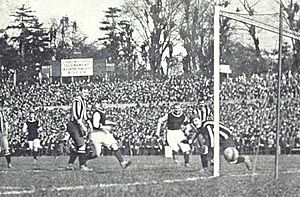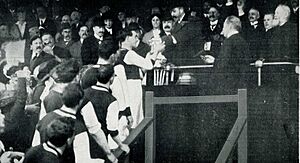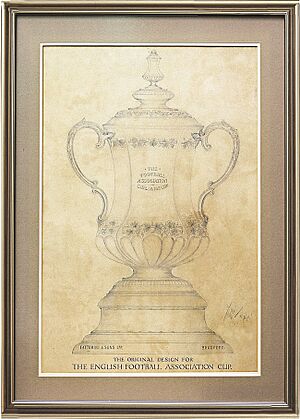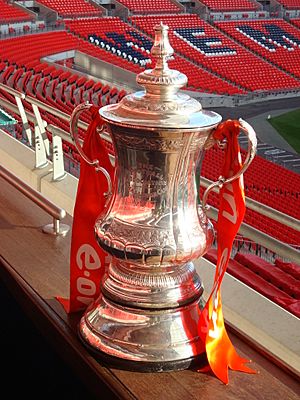FA Cup facts for kids
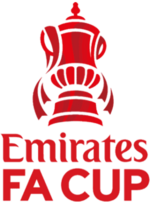 |
|
| Organising body | The Football Association |
|---|---|
| Founded | 1871 |
| Region |
|
| Number of teams | 747 (2025–26) |
| Qualifier for | UEFA Europa League FA Community Shield |
| Current champions | Crystal Palace (1st title) |
| Most successful club(s) | Arsenal (14 titles) |
| Television broadcasters | TNT Sports BBC Sport |
The Football Association Challenge Cup, known as the FA Cup, is a super exciting yearly football competition in England. It's the oldest national football tournament in the world, first played way back in the 1871–72 season! Imagine, football has been around for so long! It's organized by The Football Association (the FA). There's also a Women's FA Cup that started in 1970.
This competition is a "knockout" style, meaning if you lose a match, you're out! It's open to many football clubs across England and Wales, from the very top professional teams to smaller, local clubs. A huge number of teams, sometimes over 700, compete each year.
The tournament has 12 rounds, plus semi-finals and a grand final. Teams aren't "seeded" (meaning the best teams aren't always kept apart), so any team can play any other team! Higher-ranked teams join in later rounds. This makes it possible for smaller teams to cause big upsets, known as "giant-killings."
The winners get to lift the famous FA Cup trophy. There have been a few different versions of the trophy over the years. The winning team also gets to play in the UEFA Europa League and the FA Community Shield the next season. Arsenal has won the FA Cup the most times, with 14 titles. The current champions are Crystal Palace, who won their first title in the 2025 final.
Contents
- The FA Cup Story: A Journey Through Time
- Who Can Play in the FA Cup?
- How the FA Cup Works: Rounds and Rules
- What Winners Get: European Football and the Community Shield
- Where the Games are Played: Venues
- The Famous FA Cup Trophy
- Medals for Players
- Sponsorship of the FA Cup
- Amazing Records and Statistics
- Exciting Upsets: Giant Killings
- FA Cup Winners and Finalists
- Watching the FA Cup: Media Coverage
- See also
The FA Cup Story: A Journey Through Time
The FA Cup began in 1871. Back then, football rules were a bit messy. The Football Association (FA) created the "Laws of the Game" to make things fair. Then, a man named C. W. Alcock suggested creating a "Challenge Cup" for all clubs to compete in.
The very first FA Cup tournament started in November 1871. After 13 games, a team called Wanderers became the first champions in March 1872. They even won it again the next year!
The competition grew over time. Qualifying rounds were added in the 1888–89 season. This allowed even more teams to join the fun.
Football stopped for a while during the two World Wars. The competition was paused during World War I (after 1915) and World War II (between 1939 and 1945). It was exciting when it returned after these breaks!
The famous Wembley Stadium hosted its first FA Cup final in 1923. This match is known as the "White Horse Final" because a policeman on a white horse helped control the huge crowd! Since 1927, it's been a tradition to sing "Abide with Me" before the final.
For many years, if a match ended in a draw, teams would play a "replay" game. Sometimes, there were many replays! For example, in 1971–72, two teams, Alvechurch and Oxford City, played six matches to decide a winner! But to make the schedule easier, replays for later rounds were gradually removed. From the 2024–25 season, replays are no longer used from the first round onwards.
While Wembley was being rebuilt, the final was held in Cardiff, Wales, from 2001 to 2006. The final returned to the new Wembley Stadium in 2007.
Who Can Play in the FA Cup?
Many football clubs dream of playing in the FA Cup! To enter, clubs need to apply. The FA announces who can join in July each year.
All clubs in the top four levels of English football (the Premier League and the three divisions of the English Football League) can automatically enter. Smaller clubs from levels 5 to 9 (often called "non-league" teams) can also join if they play in other specific competitions.
Clubs must also have a suitable stadium for the matches. The FA wants to make sure every game is played in a good place.
The number of teams entering the FA Cup has changed over the years. In the 2011–12 season, a record 763 clubs took part! Now, the FA aims for a more steady number of entries, around 732 teams.
It's very rare for a top club to miss the competition. However, Manchester United once chose not to play in the 1999–2000 FA Cup. They were also playing in a new international club tournament and felt they couldn't play in both without making their team weaker. This decision caused a lot of discussion at the time.
Teams from Wales that play in English leagues can also enter. Famous Welsh clubs like Cardiff City (who won the Cup in 1927!) and Swansea City have played. Even teams from places like the Channel Islands have joined in!
How the FA Cup Works: Rounds and Rules
Tournament Overview
The FA Cup is a "knockout tournament" that starts in August and ends with the final in May. There are 12 rounds in total, plus the semi-finals and the final.
To make it fair, higher-level clubs get a "bye," meaning they don't have to play in the early rounds. There's no special "seeding," so teams are drawn randomly to play each other.
If a match ends in a draw, it used to go to a replay. However, from the 2024–25 season, replays are no longer used from the first round onwards. Instead, if a game is tied, it goes to extra time and then a penalty shootout to decide the winner on the same day.
The first six rounds are called the "Qualifying Competition." These matches are played by smaller, non-league clubs. The draws for these rounds are often regional to help teams save on travel costs. The next six rounds are the "Competition Proper," where all clubs are in one big draw.
Match Schedule
The competition starts with the "Extra Preliminary Round" in August, where the lowest-ranked teams begin their journey. As the tournament progresses, clubs from higher levels join in.
Here's a simple look at when different teams enter:
| Round | Month | Leagues entering this round |
New entries this round |
Winners from previous round |
Number of fixtures |
|---|---|---|---|---|---|
| Qualifying Competition | |||||
| Extra preliminary round | August | Level 8 clubs (96 lowest ranked) Level 9 clubs Any vacancies are filled by Level 10. |
416 | 208 | |
| Preliminary round | August | Level 8 clubs (64 highest ranked) | 64 | 208 | 136 |
| First round | September | Level 7 clubs | 88 | 136 | 112 |
| Second round | Level 6 clubs | 48 | 112 | 80 | |
| Third round | October | none | 0 | 80 | 40 |
| Fourth round | Level 5 clubs | 24 | 40 | 32 | |
| Competition Proper | |||||
| First round | November | Level 3 and 4 clubs | 48 | 32 | 40 |
| Second round | December | none | 0 | 40 | 20 |
| Third round | January | Level 1 and 2 clubs | 44 | 20 | 32 |
| Fourth round | February | none | 0 | 32 | 16 |
| Fifth round | March | 0 | 16 | 8 | |
| Quarter-finals | 0 | 8 | 4 | ||
| Semi-finals | April | 0 | 4 | 2 | |
| Final | May | 0 | 2 | 1 | |
The final match is usually played in May, after the Premier League season ends. Sometimes, the date changes for special reasons, like to prepare Wembley Stadium for other big matches. The 2025 Final was held a week before the end of the league.
How Matches are Drawn
The draws for the early qualifying rounds happen at the same time. For later rounds, the draw takes place after the previous round's matches are finished. This means teams sometimes know who they might play next if a replay is needed.
The draws for the "proper" rounds are shown live on TV. Everyone gets excited for the third-round draw, as this is when the top Premier League and Championship teams join the competition!
Deciding Tied Games
Before the 2024–25 season, if a match ended in a draw, teams would play a replay at the away team's stadium. If the replay was still tied, it would go to extra time and then a penalty shootout.
However, to help with busy football schedules, replays from the first round onwards were removed starting with the 2024–25 competition. Now, if a game is tied after normal time, it goes straight to extra time. If it's still a draw after extra time, a penalty shootout decides the winner on the same day.
Historically, some ties went to many replays. For example, in 1971–72, a game between Alvechurch and Oxford City was played six times! The Fulham team in 1975 played 12 games across six rounds to reach the final, which is a record!
What Winners Get: European Football and the Community Shield
European Football
Winning the FA Cup is a big deal! It means the team gets to play in the UEFA Europa League the next season. This is a major European competition where they can play against teams from other countries. This European spot is given even if the team is not in the top English league.
If the FA Cup winner has already qualified for a European competition through their league position, then their Europa League spot goes to the highest-placed team in the Premier League that hasn't qualified yet.
FA Community Shield
The FA Cup winners also get to play in the FA Community Shield. This is a special match played at the start of the next football season. It's usually between the FA Cup winners and the champions of the Premier League.
Where the Games are Played: Venues
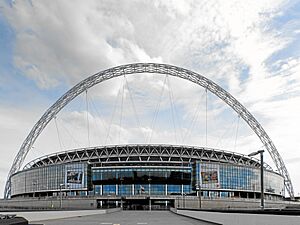
Competition Rounds
For most of the FA Cup rounds, matches are played at the home stadium of one of the two teams. The team playing at home is simply the first one drawn for that match. Sometimes, a game might be moved to a different stadium for safety reasons or if a ground isn't big enough for a very popular team.
Semi-finals
The semi-finals are very important matches! Since 2008, they have been played at the rebuilt Wembley Stadium. Before that, semi-finals were held at large stadiums across England, usually chosen to be fair for both teams traveling.
Using Wembley for the semi-finals has been a bit controversial. Some fans feel it's unfair for teams whose supporters have to travel a long way to London. Others think it makes the final less special if the semi-finals are also at Wembley. However, the FA says Wembley offers a huge capacity for fans.
Final
The grand final of the FA Cup has been played at the new Wembley Stadium since it opened in 2007. Before that, from 2001 to 2006, the final was held at the Millennium Stadium in Cardiff, Wales, while Wembley was being rebuilt.
The original Wembley Stadium hosted the final from 1923 until 2000. In the very early years, the final was played at various places, mostly in London, like The Oval and Crystal Palace.
Artificial Turf Pitches
Since the 2014–15 season, teams can play FA Cup matches on artificial turf (3G) pitches. These pitches must meet high quality standards. This change allows more clubs to host games at their home grounds.
The Famous FA Cup Trophy
The winners of the FA Cup get to hold the famous trophy, but they don't keep it forever! It's loaned to the club by the FA and must be returned by March 1st the following year.
The trophy has three parts: the cup, a lid, and a base. There have been two main designs and five actual trophies made over time.
The First Trophies (1871 Design)
The very first trophy, sometimes called the "little tin idol," was made in 1871. Sadly, it was stolen in 1895 from a shoe shop window while Aston Villa had it. It was never found! The FA fined Villa £25 to pay for a new one.
A man named Henry Burge later claimed he stole it in 1958. He said the cup was melted down to make fake coins. However, detectives couldn't prove his story.
A replica of the stolen trophy was made in 1895. This replica was used until 1910. Later, it was owned by Lord Kinnaird's family. In 2005, it was sold at auction for a huge amount of money! David Gold, a football club chairman, bought it to keep it in the country. He then loaned it to the National Football Museum in Manchester for everyone to see. In 2021, Sheikh Mansour bin Zayed Al Nahyan, the owner of Manchester City, bought it and returned it on loan to the museum.
The Current Trophy Design (from 1911)
The FA decided to change the trophy design in 1911. The new design was much larger and made by Fattorini & Sons. Coincidentally, Bradford City won it in its first year!
To protect this original 1911 trophy, an exact replica was made in 1992. This replica was used for over 20 years. But because it was handled so much, it started to show wear and tear.
So, in 2014, a third replica was made by Thomas Lyte. This one was made heavier to be more durable. It was handcrafted using old techniques and looks just like the 1911 design. The FA wanted to make sure this important symbol of English football would last for many more years.
Engraving and Ribbons
The name of the winning team is engraved on the trophy's base right after the final! This means the engraver has to work very quickly.
During the final, the trophy is decorated with ribbons in the colors of both teams playing. After the game, the ribbons of the losing team are removed. This tradition started in 1901 when the wife of a Tottenham Hotspur director tied blue and white ribbons to the cup.
Medals for Players
Each club that reaches the final receives 40 medals. These are either winners' medals (gold) or runners-up medals (silver). The clubs then give these medals to their players, staff, and officials. New medal designs were introduced for the 2021 final.
Sponsorship of the FA Cup
Since the 1994–95 season, the FA Cup has had sponsors. However, to keep the competition's famous identity, the name always includes 'The FA Cup' along with the sponsor's name.
The airline Emirates has been the main sponsor since 2015, calling it 'The Emirates FA Cup'. This sponsorship deal has been extended several times and is set to continue until 2028.
| Period | Sponsor | Name | Trophy |
|---|---|---|---|
| 1871–1994 | N/A | The FA Cup | Original |
| 1994–1998 | Littlewoods | The FA Cup sponsored by Littlewoods | |
| 1998–2002 | Axa | The AXA sponsored FA Cup (1998–1999) The FA Cup sponsored by AXA (1999–2002) |
|
| 2002–2006 | N/A | The FA Cup | |
| 2006–2011 | E.ON | The FA Cup sponsored by E.ON | |
| 2011–2014 | Budweiser | The FA Cup with Budweiser | |
| 2014–2015 | N/A | The FA Cup | |
| 2015–2028 | Emirates | The Emirates FA Cup |
Amazing Records and Statistics
Final Records
- Most wins by a team: 14, Arsenal
- Most consecutive wins: 3, shared by Wanderers and Blackburn Rovers
- Most appearances in a final: 22, Manchester United
- Biggest win in a final: 6 goals, shared by Bury (6–0 vs Derby County in 1903) and Manchester City (6–0 vs Watford in 2019)
- Most goals in a final: 7, shared by two matches, including Blackpool 4–3 Bolton Wanderers in 1953.
- Most wins by a player: 7, Ashley Cole (for Arsenal and Chelsea)
- Most wins by a manager: 7, Arsène Wenger (for Arsenal)
- Youngest FA Cup finalist: Curtis Weston (Millwall), 17 years and 119 days (2004)
- Youngest player to score in a final: Norman Whiteside (Manchester United), 18 years and 19 days (1983)
All Rounds Records
- Biggest win: Preston North End 26–0 Hyde (1887)
- Highest attendance at Wembley: 126,047 (official) at the "White Horse Final" (1923)
- Most clubs competing in a season: 763 (2011–12)
- Longest tie (most matches): 6 matches (660 minutes), Oxford City vs Alvechurch (1971)
- Fastest goal: 4 seconds, Gareth Morris (for Ashton United in 2001)
- Youngest player: Andy Awford, 15 years and 88 days (for Worcester City in 1987)
- Youngest goalscorer: Finn Smith, 16 years and 1 day (for Newport (IOW) F.C. in 2022)
Exciting Upsets: Giant Killings
One of the most thrilling parts of the FA Cup is when a smaller, lower-ranked team beats a much bigger, higher-ranked team. This is called a "giant killing"! These upsets are a huge part of the FA Cup's magic and make the competition so exciting for fans.
Non-League Giant Killings
Since 1921, it's been very rare for a team from outside the top professional leagues (a "non-league" team) to go far in the FA Cup. But it does happen!
- In the 2016–17 FA Cup, National League side Lincoln City reached the quarter-finals! They beat a Championship team and even a Premier League team (Burnley) before losing to Arsenal.
- A famous giant killing happened in 1971–72 when non-league Hereford United beat top-division Newcastle United. Hereford's equalizer goal by Ronnie Radford is still shown today!
- The biggest giant killing in terms of league difference happened in the 2025–26 FA Cup. National League North side Macclesfield (Level 6) defeated Premier League champions Crystal Palace (Level 1) 2–1! This was a massive upset, with 117 league places between the teams.
Some small clubs become known as "cup specialists" because they manage to beat bigger teams often. Yeovil Town holds the record for the most wins over league opposition as a non-league team, with 20 victories.
Non-League Teams Going Far
For non-league teams, reaching the third round proper is a huge achievement. This is when all the top Premier League teams join the competition.
- In the 2007–08 competition, Chasetown, a Level 8 team, became the lowest-ranked team ever to reach the third round proper. They earned over £60,000 in prize money!
- Marine matched this in 2020–21, also a Level 8 team, and got to play against Premier League giants Tottenham Hotspur.
- In the 2023–24 season, Maidstone United (a Level 6 team) had an amazing run, reaching the fifth round! They beat a Level 2 team, Ipswich Town, away from home. Their journey earned the club around £700,000!
Giant Killings Between League Clubs
Even within the professional leagues, upsets happen!
- In 1992, Wrexham, who were at the very bottom of the league, beat reigning champions Arsenal 2–1.
- Another big shock was in 2003 when Shrewsbury Town beat Everton 2–1. Shrewsbury was later relegated that season, making their win even more surprising!
FA Cup Winners and Finalists
Results by Team
Since it began, 45 different clubs have won the FA Cup. Teams shown in italics are no longer playing.
| Club | Wins | First final won | Last final won | Runners-up | Last final lost | Total final appearances |
|---|---|---|---|---|---|---|
| Arsenal | 14 | 1930 | 2020 | 7 | 2001 | 21 |
| Manchester United | 13 | 1909 | 2024 | 9 | 2023 | 22 |
| Chelsea | 8 | 1970 | 2018 | 8 | 2022 | 16 |
| Liverpool | 8 | 1965 | 2022 | 7 | 2012 | 15 |
| Tottenham Hotspur | 8 | 1901 | 1991 | 1 | 1987 | 9 |
| Manchester City | 7 | 1904 | 2023 | 7 | 2025 | 14 |
| Aston Villa | 7 | 1887 | 1957 | 4 | 2015 | 11 |
| Newcastle United | 6 | 1910 | 1955 | 7 | 1999 | 13 |
| Blackburn Rovers | 6 | 1884 | 1928 | 2 | 1960 | 8 |
| Everton | 5 | 1906 | 1995 | 8 | 2009 | 13 |
| West Bromwich Albion | 5 | 1888 | 1968 | 5 | 1935 | 10 |
| Wanderers | 5 | 1872 | 1878 | 0 | — | 5 |
| Wolverhampton Wanderers | 4 | 1893 | 1960 | 4 | 1939 | 8 |
| Bolton Wanderers | 4 | 1923 | 1958 | 3 | 1953 | 7 |
| Sheffield United | 4 | 1899 | 1925 | 2 | 1936 | 6 |
| Sheffield Wednesday | 3 | 1896 | 1935 | 3 | 1993 | 6 |
| West Ham United | 3 | 1964 | 1980 | 2 | 2006 | 5 |
| Preston North End | 2 | 1889 | 1938 | 5 | 1964 | 7 |
| Old Etonians | 2 | 1879 | 1882 | 4 | 1883 | 6 |
| Portsmouth | 2 | 1939 | 2008 | 3 | 2010 | 5 |
| Sunderland | 2 | 1937 | 1973 | 2 | 1992 | 4 |
| Nottingham Forest | 2 | 1898 | 1959 | 1 | 1991 | 3 |
| Bury | 2 | 1900 | 1903 | 0 | — | 2 |
| Huddersfield Town | 1 | 1922 | 4 | 1938 | 5 | |
| Leicester City | 1 | 2021 | 4 | 1969 | 5 | |
| Oxford University | 1 | 1874 | 3 | 1880 | 4 | |
| Royal Engineers | 1 | 1875 | 3 | 1878 | 4 | |
| Derby County | 1 | 1946 | 3 | 1903 | 4 | |
| Leeds United | 1 | 1972 | 3 | 1973 | 4 | |
| Southampton | 1 | 1976 | 3 | 2003 | 4 | |
| Burnley | 1 | 1914 | 2 | 1962 | 3 | |
| Cardiff City | 1 | 1927 | 2 | 2008 | 3 | |
| Blackpool | 1 | 1953 | 2 | 1951 | 3 | |
| Crystal Palace | 1 | 2025 | 2 | 2016 | 3 | |
| Clapham Rovers | 1 | 1880 | 1 | 1879 | 2 | |
| Notts County | 1 | 1894 | 1 | 1891 | 2 | |
| Barnsley | 1 | 1912 | 1 | 1910 | 2 | |
| Charlton Athletic | 1 | 1947 | 1 | 1946 | 2 | |
| Old Carthusians | 1 | 1881 | 0 | — | 1 | |
| Blackburn Olympic | 1 | 1883 | 0 | — | 1 | |
| Bradford City | 1 | 1911 | 0 | — | 1 | |
| Ipswich Town | 1 | 1978 | 0 | — | 1 | |
| Coventry City | 1 | 1987 | 0 | — | 1 | |
| Wimbledon | 1 | 1988 | 0 | — | 1 | |
| Wigan Athletic | 1 | 2013 | 0 | — | 1 | |
| Queen's Park | 0 | — | 2 | 1885 | 2 | |
| Birmingham City | 0 | — | 2 | 1956 | 2 | |
| Watford | 0 | — | 2 | 2019 | 2 | |
| Bristol City | 0 | — | 1 | 1909 | 1 | |
| Luton Town | 0 | — | 1 | 1959 | 1 | |
| Fulham | 0 | — | 1 | 1975 | 1 | |
| Queens Park Rangers | 0 | — | 1 | 1982 | 1 | |
| Brighton & Hove Albion | 0 | — | 1 | 1983 | 1 | |
| Middlesbrough | 0 | — | 1 | 1997 | 1 | |
| Millwall | 0 | — | 1 | 2004 | 1 | |
| Stoke City | 0 | — | 1 | 2011 | 1 | |
| Hull City | 0 | — | 1 | 2014 | 1 | |
Winning Multiple Cups
- Four clubs have won the FA Cup two or more times in a row: Wanderers, Blackburn Rovers, Tottenham Hotspur, and Arsenal.
Winning Other Trophies Too!
- A "treble" means winning three major competitions in one season. Manchester City (2019) is the only English club to win the domestic treble (league, FA Cup, and League Cup).
- Manchester United (1999) and Manchester City (2023) are the only English teams to win the "continental treble" (league, FA Cup, and Champions League).
- Eight clubs have won the FA Cup and their league title in the same season, which is called a "double."
Non-English Winners
- Only one non-English team has ever won the FA Cup: Cardiff City from Wales, in 1927! They beat Arsenal in the final.
- The Scottish team Queen's Park reached the final twice in the 1880s but lost both times.
Winners from Lower Divisions
- Since the Football League started in 1888, only eight teams not in the top division have won the FA Cup. Tottenham Hotspur (1901) is the only non-league team to win it since the League began.
- Sunderland's win in 1973 was a big surprise, as they beat top-flight Leeds United.
- West Ham United's victory in 1980 was also a shock, as they were in the second division and beat Arsenal. This was the last time a team from outside the top division won the FA Cup.
Watching the FA Cup: Media Coverage
UK Broadcasters
The FA Cup Final is such a big event that it's one of the special events that must be shown live on free-to-air TV in the UK.
- The first FA Cup Final was broadcast on radio in 1926.
- The first final shown on BBC Television was in 1937.
- For many years, the BBC and ITV shared coverage of the final.
- From the 2021–22 season, the BBC and ITV became joint broadcasters, meaning all FA Cup matches were shown on free-to-air TV.
- However, from the 2025–26 season, TNT Sports obtained full broadcasting rights. The BBC made a deal with TNT Sports to continue showing some games for free, including two games per round up to the quarter-finals, one semi-final, and the final.
| Seasons | Free-to-air | Pay-TV | Streaming |
|---|---|---|---|
| 1990–91 | BBC | Sky Sports | |
| 1996–97 | ITV | ||
| 2001–02 | BBC | ||
| 2008–09 | ITV | Setanta Sports | |
| 2009–10 | FA Player | ||
| 2010–11 | ESPN | ||
| 2013–14 | BT Sport | ||
| 2014–15 | BBC | ||
| 2019–20 | |||
| 2020–21 | FA Player | ||
| 2021–22 | BBC/ITV | ||
| 2025–26 | BBC | TNT Sports |
See also
 In Spanish: FA Cup para niños
In Spanish: FA Cup para niños
 | Misty Copeland |
 | Raven Wilkinson |
 | Debra Austin |
 | Aesha Ash |


